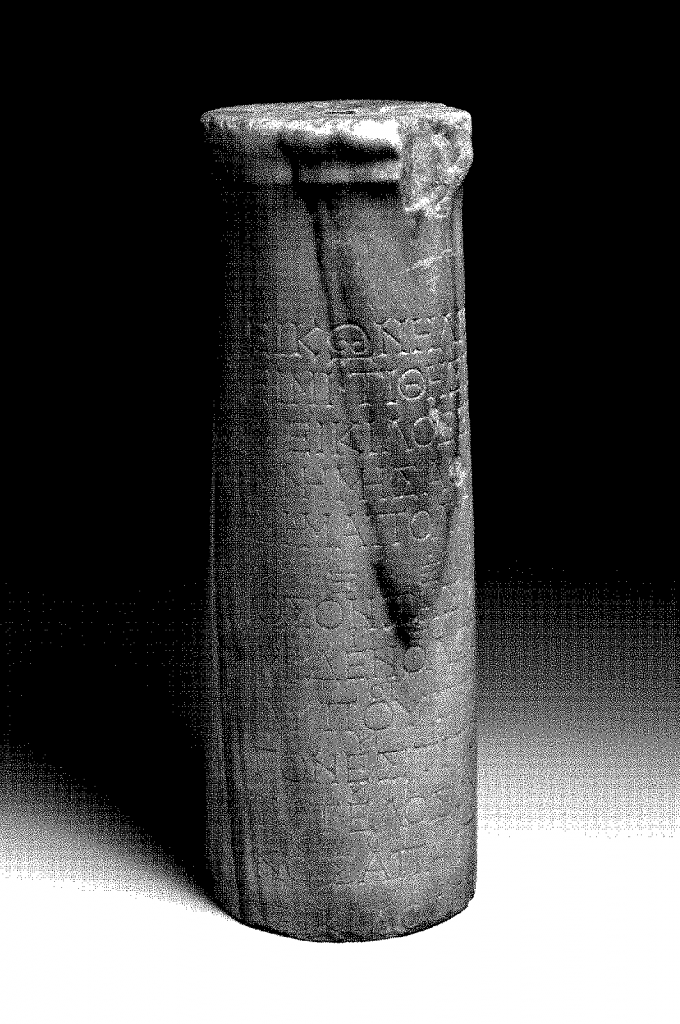Last summer, we featured a Sumerian hymn considered the oldest known song in the world. Given the popularity of that post, it seems we may have long underestimated the number of ancient-musicophiles on the internet. Therefore, we submit today for your approval the Seikilos epitaph, the oldest known complete musical composition — that is to say, a song that our 21st-century selves can still play and hear in its intended entirety, more or less as did the ancient Greeks who lived during the first-century (or thereabouts) era of its composition.
The Seikilos epitaph’s survival in one piece, as it were, no doubt owes something to its shortness. The Greeks could carve the entire thing onto the surface of a tombstone, exactly the medium on which the modern world rediscovered it in 1885 near Aidin, Turkey. Its lyrics, liberally brought into English, exhort us as follows:
While you live, shine
have no grief at all
life exists only for a short while
and time demands its toll.
The surface also bears an explanatory inscription about — and written in the voice of — the artifact itself: “I am a tombstone, an image. Seikilos placed me here as an everlasting sign of deathless remembrance.” The Greeks, like many peoples in the ancient world of unvarnished mortality, relished a good memento mori, and this oldest complete song in the world offers one whose message still holds today, and which we can trace all the way to more recent words, like those of William Saroyan, when he said, “In the time of your life, live — so that in that good time there shall be no ugliness or death for yourself or for any life your life touches.”
Or for another interpretation, you can hear a modern, guitar-driven cover of the Seikilos epitaph by Vlogbrother and famous internet teacher Hank Green, in a truly striking example of two eras colliding. But of course, the Youtube era has also made everyone a critic. As one commenter perfectly put it, “I prefer his earlier stuff.”
Related Content:
Listen to the Oldest Song in the World: A Sumerian Hymn Written 3,400 Years Ago
What Ancient Greek Music Sounded Like: Hear a Reconstruction That is ‘100% Accurate’
Hear The Epic of Gilgamesh Read in the Original Akkadian and Enjoy the Sounds of Mesopotamia
Learn Latin, Old English, Sanskrit, Classical Greek & Other Ancient Languages in 10 Lessons
Colin Marshall writes on cities, language, Asia, and men’s style. He’s at work on a book about Los Angeles, A Los Angeles Primer, and the video series The City in Cinema. Follow him on Twitter at @colinmarshall or on Facebook.



“Seikilos Epitaph”, the song is heart-touching, lasting and haunting and echoes from more than two thousand years. It merely says one thing — we are all a continuation of the same race. same feelings and same sentiments.
Then how we have gone so different from each other? Is it the time, that Seikilos talked about. I wonder.….….…
Sorry, Mr Clark, it has no danceable beat sorta herky jerky. I don’t see kids dancing to it and it will soon disappear from view. I give it a 2 for a good amateur try but it has no future.
Xeres Archidias
If this song is Sumerian it cannot also be Greek. Different cultures, different times. I cannot make out the language of the song, so I presume it’s been faked.
Yikes! I must be wacko.…I’m “hearing” Irish dancing and rhythms! Seriously! Maybe I’ve just been listing to Celtic Thunder too much.
I love how it gets all heavy towards the end, kind of like Stairway to Heaven.